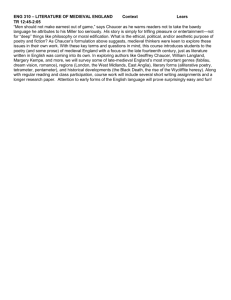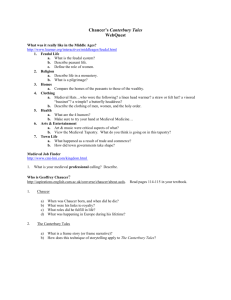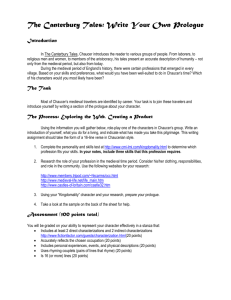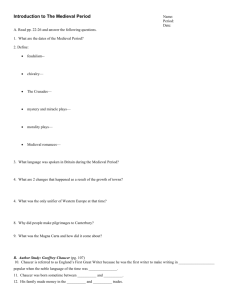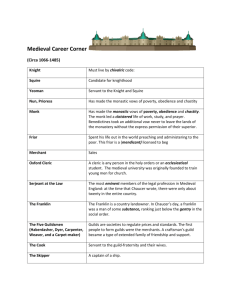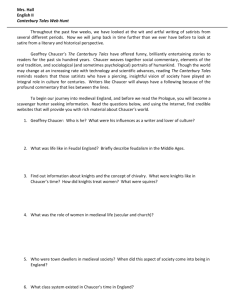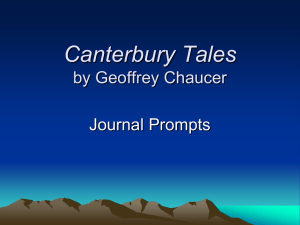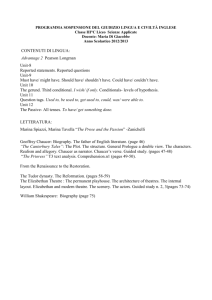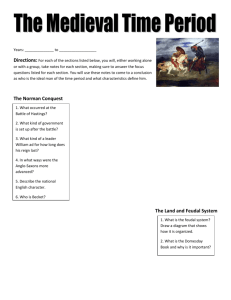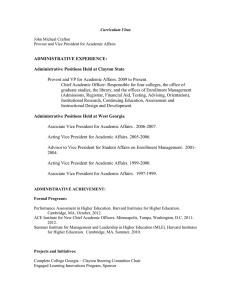Name Email Phone
advertisement
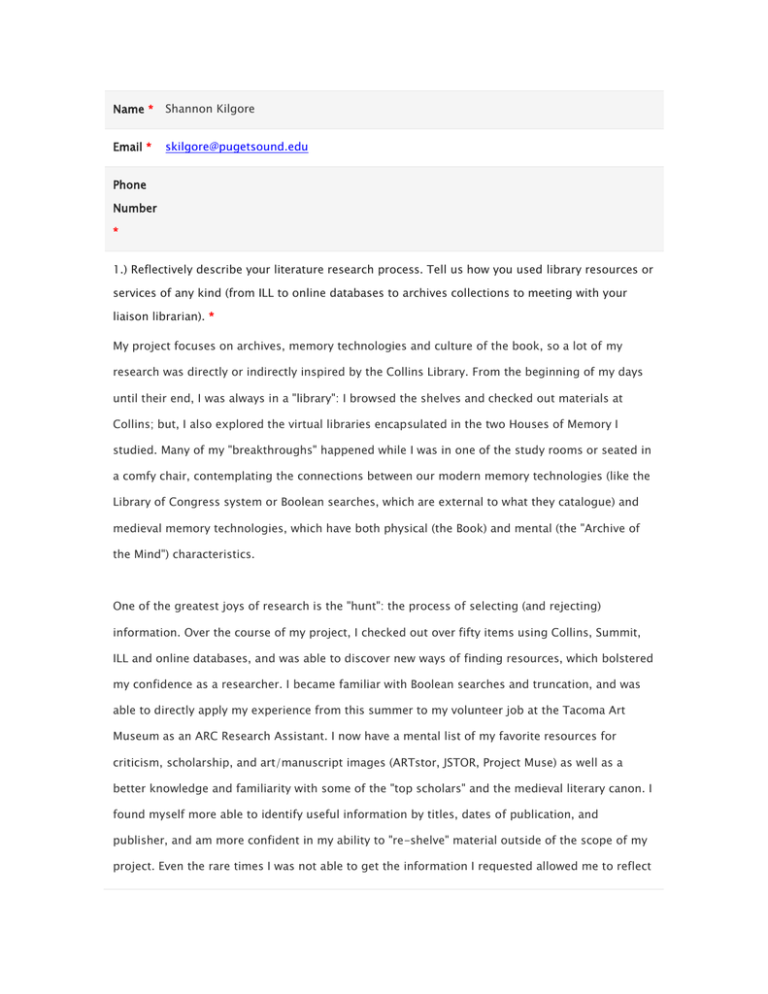
Name * Shannon Kilgore Email * skilgore@pugetsound.edu Phone Number * 1.) Reflectively describe your literature research process. Tell us how you used library resources or services of any kind (from ILL to online databases to archives collections to meeting with your liaison librarian). * My project focuses on archives, memory technologies and culture of the book, so a lot of my research was directly or indirectly inspired by the Collins Library. From the beginning of my days until their end, I was always in a "library": I browsed the shelves and checked out materials at Collins; but, I also explored the virtual libraries encapsulated in the two Houses of Memory I studied. Many of my "breakthroughs" happened while I was in one of the study rooms or seated in a comfy chair, contemplating the connections between our modern memory technologies (like the Library of Congress system or Boolean searches, which are external to what they catalogue) and medieval memory technologies, which have both physical (the Book) and mental (the "Archive of the Mind") characteristics. One of the greatest joys of research is the "hunt": the process of selecting (and rejecting) information. Over the course of my project, I checked out over fifty items using Collins, Summit, ILL and online databases, and was able to discover new ways of finding resources, which bolstered my confidence as a researcher. I became familiar with Boolean searches and truncation, and was able to directly apply my experience from this summer to my volunteer job at the Tacoma Art Museum as an ARC Research Assistant. I now have a mental list of my favorite resources for criticism, scholarship, and art/manuscript images (ARTstor, JSTOR, Project Muse) as well as a better knowledge and familiarity with some of the "top scholars" and the medieval literary canon. I found myself more able to identify useful information by titles, dates of publication, and publisher, and am more confident in my ability to "re-shelve" material outside of the scope of my project. Even the rare times I was not able to get the information I requested allowed me to reflect on whether I needed a resource in the first place, or was merely trying to check off all the items in my proposal bibliography. (It was more often the latter case, for the more I learned, the more I wanted to continue researching, "just to make sure" I had all my facts straight.) Lastly, the process of gathering materials for study and my examination of the idea of the "Book" brought me into closer contact with one of the main reasons for the existence of Archives in the first place: the cultivation and collection of aesthetically pleasing, intricately crafted objects. Along with many members of my generation, I have grown up with a Word Processor, and so took certain things for granted. Deliberate book-making choices in paper material, font, kerning, margins, binding individualize a manuscript or printed book and memorialize the creator's artistry. This "accidental" effect of my research helped me to translate what the library displays were trying to convey all along (a book is much, much more than its contents) into a renewed desire to review my own book collection and investigate preservation methods. (Perhaps next time...) 2.) Tell us about a challenge you faced while doing literature research and how you overcame it. * I had a few "dry spells" when it did not seem like the information I was looking for was available. I have my advisor to thank for suggesting other resources and avenues into the text. She encouraged me to look at the Robert de Lisle Book of Hours on ARTstor. That search in particular yielded weeks' worth of visual material (more than I was able to fit in the final paper) and also helped me form a mental model of what I was noticing all along in the texts without the help of images. She also encouraged me to make recordings of myself reading passages from the House of Fame, both so I could gain a better familiarity with the Middle English dialect and for submission to the library so future students may listen along with their Chaucer texts. From these efforts I was able to better understand both Chaucer's medieval audience (who had a multisensory relationship with their Books) and potential modern audiences, who have a mul ti-media experience of their world. Another obstacle developed during the writing process, when I was struggling to synthesize a vast amount of material into a cohesive paper. Luckily, due what I was taught in high school by my senior year English teacher, Dr. Englund, I used my research skills to overcome this challenge. Throughout the research process, I painstakingly wrote out (and sometimes typed out) new information, quotes from my sources, paraphrases, and my own thoughts onto 4" x 6" note cards. I catalogued the cards by the order in which I wrote them, source, and page number, and later filed them by subject matter for easy access. When I finally sat down to write my paper, the "subject matter" tabs helped me outline each individual section of the research paper ("Culture of the Book," "Dream Visions," etc.) 3.) How does your research contribute to the scholarly conversation in your field? What is the significance of your research, in layperson’s terms? * What I have found is that in general, authors know that their audiences are forgetful, and so in order to make their works more memorable and worthy of remembrance, they reenact the process of remembering so that their readers may write what they learn into the books of their experiences. I have examined the different avenues these authors have taken in order to create memory and "good reading" for their audiences, and have found that both authors share many similarities in their choice of "mode" or "authorial coding", narrative organization and visiographic structure. These various techniques allow Chaucer and Danielewski to establish their authority, mediate between the faculties of imagination and memory, and control reader reception. The House of Fame and House of Leaves are essentially love letters written to literature about the self conscious process of becoming an auctor from two authors with large mental archives and the ability to work in the accommodating modes of the dream vision and the academic essay. The result of their endeavors is a grand drama of story, fiction, and discovery. I am contributing to one of the newer conversations in medieval studies by bridging the gap between Chaucer's time and ours. I am not the first person to do so in this regard; however, I can say that I am the first to make the connection between Danielewski's "House of Leaves" and Chaucer's "House of Fame." By examining the various textual and extra-textual intersections between these two works, I hope to start a new conversation bridging the works of Chaucer's time with our own "experimental" and "post-modern" literature, and also to continue the work of those in the field of medieval studies who have already made the connections between the various technologies of our digital age and the "virtual" technologies of the Middle Ages.
